- Home
- Anthony Trollope
The Small House at Allington Page 3
The Small House at Allington Read online
Page 3
As the novel proceeds Eames certainly ‘ripens’, and is successful in both public and private life. But even his noblest deeds are qualified by an accompanying touch of absurdity. Instead of rescuing a damsel from the bull, Johnny bails out the portly, quasi-somnambulistic Earl De Guest. There is nothing contrived about the episode (as there is about the bull-business in Hardy’s The Mayar of Casterbridge), and as novelistic bulls go Lambkin is agreeably formidable; but Johnny’s proceedings are not allowed even a ghost of the Romantic earnestness which surrounds the rescue of Sir William Ashton and Lucy in The Bride of Lammermoor. His deeds of derring-do as the ‘prince of matadores’ merely help to break the ice among the oldies in the Guestwick Manor drawing-room, and his adventures are retailed with Woodhousian affability. In a similar way Eames’s pugilistic glory on Paddington Station is accompanied with a tip-toe through the banana skins. A black eye, which Eames succeeds in inflicting on Crosbie, is inherently humorous, of course; but Trollope prefaces the moment of violence with the complaints of testy old man, who won’t be hurried into his seat at Barchester Junction; shows Eames’s unwillingness to attack Crosbie in the face of an old lady tucked away in a corner of the carriage; allows the combatants to fall incongruously into W. H. Smith’s station-bookstall; introduces a supernumerary ‘benevolent medical man’ offering to apply leeches to Crosbie’s bruise; and features a railway official whose forbidding dignity depends on the proper arrangement of his hat. This is the unheroic fuddled heroism of everyday life, frequently upstaged by self-important circumstance absorbed in its own business. The episode graphically illustrates Trollop’s realistic methods, but does nothing for Eames’s credit as a public redresser of wrongs.
Things never really get better for him. When he cracks the puzzle of the Crawley cheque in The Last Chronicle of Barset his ‘knight errantry’ has its touch of facetious Quixotism, and even in the description of his walk back to Guestwick after Lily has refused him, long recognized as one of the most moving moments in The Small House, there is something incongruously buoyant about the reflections on Sir Raffle’s absurdities, as though Eames’s inward despair must always be marked by outward flippancy:
He made his way out by the front door, and through the churchyard, and in this way on to the field through which he had asked Lily to walk with him. He hardly began to think of what had passed till he had left the squire’s house behind him. As he made his way through the tombstones he paused and read one, as though it interested him. He stood a moment under the tower looking up at the clock, and then pulled out his own watch, as though to verify the one by the other. He made, unconsciously, a struggle to drive away from his thoughts the facts of the late scene, and for some five or ten minutes he succeeded. He said to himself a word or two about Sir Raffle and his letters, and laughed inwardly as he remembered the figure of Rafferty bringing in the knight’s shoes. He had gone some half mile upon his way before he ventured to stand still and tell himself that he had failed in the great object of his life.
In Ayala’s Angel Tom Tringle’s unrequited devotion for the heroine is made unfortunately ridiculous by his propensity for vulgar overdressing and distressing romanticism. Eames is less absurd than Tom Tringle, but his genial vitality (the origin of his popular appeal) perpetually undermines our sympathy with him as a lover. Fatally, as Trollope points out, he is unable to live up to the expected seriousness of the juvenile lead, his love for ‘L.D.’ refusing to dovetail with the grotesquerie of his London life. For much of The Small House at Allington his destiny is welded to the drunken middle-aged maunderings of Orson Lupex, the theatrical sexiness of Mrs Lupex and the lugubriousness of Mrs Roper, with her Grand Quest for ‘respectbility’ and the means to pay the butcher. The denizens of Burton Crescent stick like burrs to Johnny (the early reviewers, sniffing ‘vulgarity’, gave him a lukewarm reception as a result), and it is surely not an accident when he attracts a fresh set of undesirable companions (second-rate artists and stock-jobbers) in The Last Chronicle of Barset.
Trollope handles both the London phases of Eames’s life well, but the modern reader is likely to find the Civil Service interiors more engrossing than the doings of Burton Crescent. They are a part of an inset chronicle of Civil Service life which Trollope commenced in 1858 with The Three Clerks, carried through the 1860s in The Small House and The Last Chronicle and concluded in one of the stronger sections of an uneven late novel, Marion Fay (1882). Some of the lesser official lights in The Small House do not progress much beyond their type-names: Butterwell’s conciliatory smoothness is brought into play in every scene in which he appears; Major Fiasco is the embittered rallying-point for departmental entropy; Mr Kissing, with his nitpicking and threatening ledgers, is to be found in every phase of departmental life. But the choric scenes are richer, as when the weather-vane of the General Committee Office sets (quite unreasonably) against Crosbie and his black eye in Chapter 35; or the mingled good wished and resentments of the second-raters left behind erupt in the bantering of the promoted Eames in Chapter 46. Best of all is Sir Raffle Buffle, a grand vision of evasive pomposity. In An Autobiography Trollope disclaims an original for the portrait, but critics have been keen to suggest Trollope’s boss for most of the 1830s, Colonel William Leader Maberly. Certainly Johnny Eames stands up to Buffle’s flummeries with admirable importunacy, much as the reminiscent Trollope might have wished he had stood up to Maberly (though there are anecdotes in An Autobiography suggesting that Maberly did not have everything his own way). On one level Buffle is little more than a delicious absurdity, his ‘cracked bell’ of a voice jingling grandiloquently as he drops names and appoinments with an audible clatter. As the novel proceeds, however, Trollope singles out a ‘gentle insanity’ in his attitudinizing, evasions and kow-towing, and he is elevated to one of the ‘heroes’ (or, at any rate, occupational hazards) of the service: a sort of disembodied departmental utterance, a cluster of repeated rigmaroles in which no one, except himself, seems to believe.
Where Sir Raffle is essentially a solitary Trollopian egoist, the De Courcys function as a clan, in spite of an appealing individuality in their manner of dreadfulness. Earl De Courcy is cantankerous and senescent, and revenges himself on an incomprehensible universe with immemorial acts of malice. Other people’s misfortunes and a dose of alcohol are the only things which raise a laugh from him in the course of the novel. His wife is long-suffering, largely because snobbery goads her into preserving her social role. She achieves martyrdom by way of exile at Baden-Baden at the end of the book. The heir to the De Courcy estates, Lord Porlock, is a satirically minded sensualist who is going to revenge himself on the whole pack after his father’s death. The remaining De Courcys are a collection of spongers, sybarites and bores. Lady Amelia has opted for suburban respectability at St John’s Wood and consoles herself with wittily complacent asides as to the parlous predicaments of her vainer sisters and brothers. The Honourable John persecutes any member of the family who will keep him in cigars and lend an ear to his anecdotes, and is regularly but usually ineffectually shown the door. The Honourable George, who has married money in the shape of the middle-aged daughter of a coal-merchant, has developed a taste for miserliness, and resolves to squeeze every penny out of the family property while there is yet time:
He hung by the paternal mansion, either in town or country; drank the paternal wines, rode the paternal horses, and had even contrived to obtain his wife’s dresses from the maternal milliner.
This last-mentioned lady is treated in a fashion which offers a striking cameo of De Courcy courtliness:
She was always called Mrs George, and the effort made respecting her by everybody in and about the family was to treat her as though she were a figure of a woman, a large well-dressed resemblance of a woman, whom it was necessary for certain purposes that the De Courcys should carry in their train.
The Lady Rosina is an energetic and importunate evangelical, on her few apearances in the novel as unfailing in her unselfconscious absurdit
ies as Jane Austen’s Mary Bennet. The Lady Margaretta is perhaps the most outwardly pathetic of the family: a chilly snob who sacrifices her social life on the altar of being grander than other people. Trollope accords her a glassy sympathy. He reveals the ghastliness of these people with Jonsonian exactitude and economy, but without Jonsonian spleen. He discovers something poignant in the hierarchical devotions of empty grandeur and the resourcefulness of the very idle. Only the canny sycophantic son-in-law Mr Gazebee pays residual respect to the rank of Earl. It is a useful handle to his business.
These are the belongings of the thirty-plus-year-old Lady Alexandrina who so captivates Apollo Crosbie, and Trollope weighs her in the same balance. She has made a stiff appearance in Chapter 37 of Barchester Towers (condescending to be sour and taciturn at the Ullathorne Sports), and has some ferociously moral things to say on the subject of Mary Thorne’s illegitimacy in the fourth chapter of Dr Thorne. Like Georgiana Longestaffe in The Way We Live Now she has worked the marriage-market in a po-faced way for fourteen years, and when Crosbie (who has known her for half that time) offers himself at Courcy Castle, she decides it is time to cut her losses. There is some flirtation over the billiard-maces, but soon after that Lady Alexandrina has done with love. She wants her carriage, her friends and her social gatherings; not getting them with Crosbie, she settles for consequence on a reduced scale among the ex-pats at Baden-Baden. After only ten weeks the marriage is at an end, Crosbie’s appreciation of his bride’s beauty having dwindled into a determination to see her as a second edition of her mother. Lady Alexandrina’s inferiority to Lily Dale is frequently signified, but Trollope does not hold it very much against her. When Lady De Courcy and Lady Alexandrina procrastinate in the Bond Street emporium over which egregiously floral carpet to choose for the house in Princess Royal Crescent, Crosbie, who prefers a simple pattern himself, might just have time to remember Lily Dale, the ‘wondrous flower’ that bloomed upon the carpet at Allington. On the whole Trollopw is drily content to chart the terminal disappointment of his two disillusioned egoists. No great injustice is done when the exigencies of plot kill one and release the other from his matrimonial bonds at the beginning of The Last Chronicle of Barset. Lady Alexandrina has what she wants out of life, give or take a pair-and-a-half of coach-horses. Crosbie is tough enough to fight another day.
With so ‘rapacious and decadent’ a clan as the De Courcys at the centre of the novel (R. C. Terry’s phrase),16 it is unsurprising that recent critics (notably Kincaid) have striven to present The Small House at Allington as a version of Pastoral, in which, as in The Way We Live Now, the ancestral values of the shire counties are forlornly opposed to metropolitan cynicism and self-seeking. As with any attempt to schematize Trollope, the results are inevitably reductive. Far from typifying traditional England, Squire Dale of Allington and those around him ultimately represent nothing but themselves. The Squire’s brother (the gambling half-pay colonel of Torquay) is quite as selfish as any of the De Courcys, and his heir, Bernard, is the driest of dry sticks. His gardener, Hopkins, is one of the most agreeably crossgrained men in the Trollope canon, obstinately refusing to play the role of ‘old Adam’s likeness’. He kicks up an unreasonable fuss about some manure in the last chapter, tells everybody their own business when it pleases him, utters hypocritical folk-wisdom to the effect that ‘a poor man mustn’t never lie’ when the denizens of the Small House plead specious headaches, and finally shows his ‘submission to his master’, with whom he has quarrelled, ‘mainly by consenting to receive his wages for the two weeks which he had passed in idleness’. Hugh Walpole calls him ‘one of the finest gardeners in fiction’:17 he is certainly one of the most lively. But he is no advertisement for the poetry of residual feudalism.
Neither will Squire Dale conform to the pattern of a threatened rural idyll. He most usefully illustrates Trollope’s interest in the difficulties of those who are outwardly repugnant to other people, and consequently habitually misunderstood. Trollope was especially proud of his portrait of his ‘old squire down at Allington’, believing his ‘life as a country gentleman with rather straitened income’ had been ‘well described’. Christopher Dale remains single after an early disappointment in love (the parallels with his niece Lily are obvious), drawing gentle solace from the network of grievances which comes down the years to constitute his life. Dale is not a particularly hard man, though he acquires that reputation as landlord and as head of the family. His characteristic failing, if he can be said to have one, is a lack of geniality. He is outwardly proprietorial (‘he could not ask; he could only demand‘), but covertly generous. He lets Mrs Hearn have her cottage at a peppercorn rent, but fails to commiserate at social gatherings with her deafness and rheumatism. He delivers his compliments in ‘a harsh unsympathizing vouce’. He seems congenitally incapable of demonstrating his affection for his family; ‘His thoughts were ever gentler than his words, and his heart softer than any exponent of his heart that he was able to put forth.’ A minor crotchet about firelighting becomes a perennial bone of contention with his brother’s widow. A sort of selfdefeating emotional logic binds him to repeated disappoinment: ‘It had ever been to him a grumbling, cross–grained, unpleasant world; and he did not expect from Mrs Hearn, or from his sister-in-law, anything better than that to which he had ever been used.’ Much as in Cousin Henry the unprepossessing heir of Llanfeare alienates by cravenness, the difficulties of the squire are compounded by his fatal lack of charm. The squire has the malaise in its acutest form, but nephew Bernard is, by the end of the novel, himself a potential casualty. He is a man who has acquired ‘the reputation of a talent’ from going about his business with solid common sense, and it surprises nobody when Bell Dale turns him down. But he ‘was in love with his cousin Bell according to his manner and fashion’, and seems to cling to his dry mixture of duty and affection with the familiar family obstinacy. Whether he gets over Bell’s marriage to Dr Crofts when he goes out to India is not explained; what is clear is that Bell and the ladies at Allington go on thinking there is more head than heart about him, whereas Trollope is less categorical: ‘He was a man capable of doing anything well in the doing of which a little time for consideration might be given to him; but he had not in him that power of passion which will force a man to eloquence in asking for that which he desires to obtain.’ A letter does him more good than an interview, and in this there are obvious similarities with his uncle’s inability to ‘speak quickly’ on matters near his heart.
What finally defeats critical attempts to prove that the Alllington chapters uniformly dramatize the wholesomeness of rural England is their success in dramatizing the inner lives of complex men and women. It is characteristic of Trollope to deploy the kind of novelistic care on minor figures that partial readings of the book, like Knox’s, suggest is reserved for John Eames or Lily Dale. The love scene between Bell and Dr Crofts in Chapter 38, for example, is presented with unexpected physical attentiveness. Bell stands on the hearthrug before the dying fire, between Crofts and the flames. Crofts dreamily keeps his chair. Even if Crofts’ proposal emerges, as one critic has it, ‘incoherently’,18 inarticulate love flowers in the darkness, its mechanism gentle handclasps and the ‘perfect ease and self-possession’ of eloquent silence. The less propitious encounter between Bell and her cousin Bernard in Chapter 8 is, anything, even more assiduosly presented, demonstrating that Trollope was prepared to lavish his full artistic resources even in apparently adventitious corners of the book. When the scene begins Bernard is dutiful, Bell resistant, and their physical proximity probably disturbs them both:
They had sat down on the turf close to the ha-ha, and they were so near that Bernard was able to put out his hand with the view of taking that of his cousin within his own. But she contrived to keep her hands locked together, so that he merely held her gently by the wrist.
Bell’s refusal spurs Bernard’s resolve (‘The thing that he had wanted moderately, he now wanted the more in that it was denied to
him’), and Trollope’s next physical vignette meticulously suggests Bell’s intransigence and Bernard’s deliberative laguor:
For some minutes they thus remained, looking down into the ha-ha. She still kept her old position, holding her hands clasped together over her knees; but he was now lying on his side, supporting his head upon his arm, with his face indeed turned towards her, but with his eyes fixed upon the grass.
It would be unreasonable to suggest that such intensely and convincingly dramatized moments demonstrate the superiority of The Small House at Allington to the remainder of the Trollope canon. Such precision is characteristic of moments where Trollope’s imagination is fully involved, and these are to be found in every novel, as Stephen Wall has shown. Trollope’s proficiency in demonstrating the way that social pressure bears down on personal dilemma (Hutton, reviewing the present novel, called it his command of the ‘moral hooks and eyes of life’) is also a common factor in his best writing. What may be claimed for The Small House is that is a large-scale work (260,000 words) without obvious longueurs or crude underplotting; that its academic reputation as a novel of uncharacteristic darkness and morbidity is largely undeserved; and that there are at least some senses in which it deserves the (admittedly extravagant) eulogy which it receives in Trollope’s Autobiography: ‘taking [it] all through, I do not think that I have ever done better work’.
J.T.

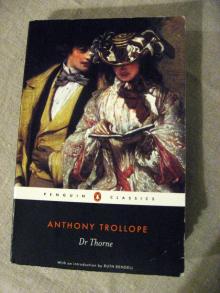 Doctor Thorne
Doctor Thorne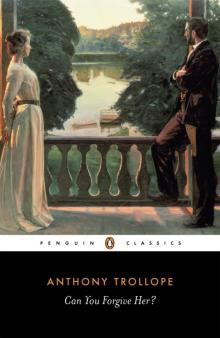 Can You Forgive Her?
Can You Forgive Her?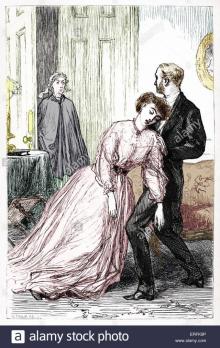 The Last Chronicle of Barset
The Last Chronicle of Barset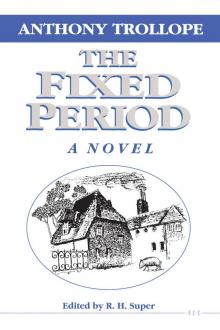 The Fixed Period
The Fixed Period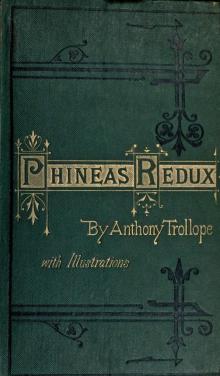 Phineas Redux
Phineas Redux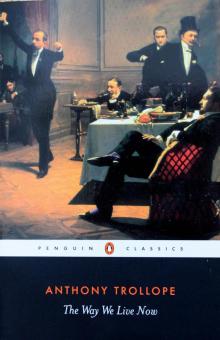 The Way We Live Now
The Way We Live Now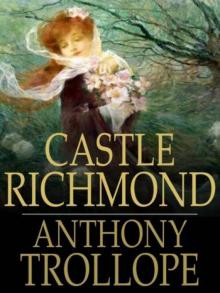 Castle Richmond
Castle Richmond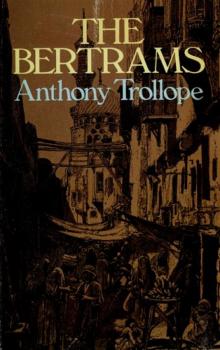 The Bertrams
The Bertrams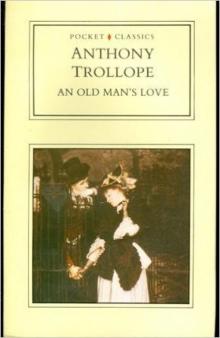 An Old Man's Love
An Old Man's Love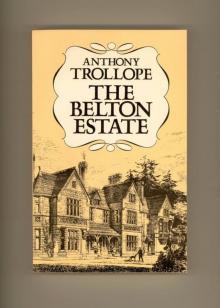 The Belton Estate
The Belton Estate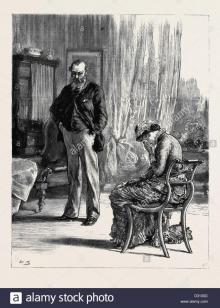 Marion Fay: A Novel
Marion Fay: A Novel The Claverings
The Claverings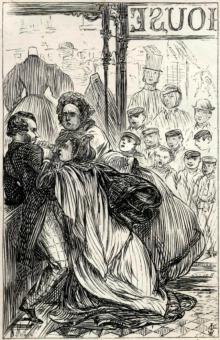 The Struggles of Brown, Jones, and Robinson
The Struggles of Brown, Jones, and Robinson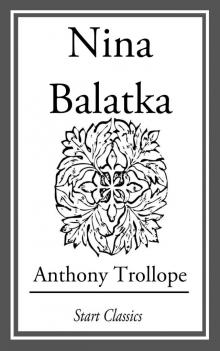 Nina Balatka
Nina Balatka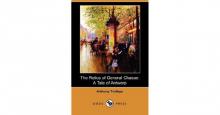 The Relics of General Chasse: A Tale of Antwerp
The Relics of General Chasse: A Tale of Antwerp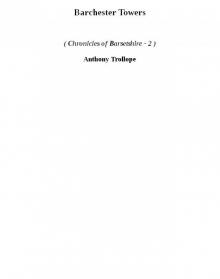 Barchester Towers cob-2
Barchester Towers cob-2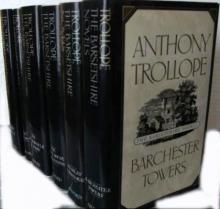 The Chronicles of Barsetshire
The Chronicles of Barsetshire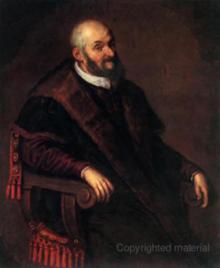 The Warden cob-1
The Warden cob-1 Framley Parsonage
Framley Parsonage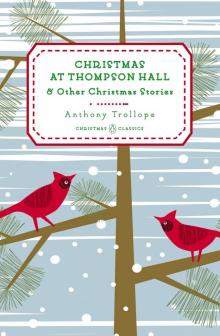 Christmas at Thompson Hall
Christmas at Thompson Hall The Warden
The Warden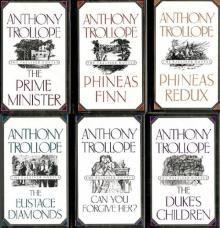 The Palliser Novels
The Palliser Novels The Small House at Allington
The Small House at Allington Barchester Towers
Barchester Towers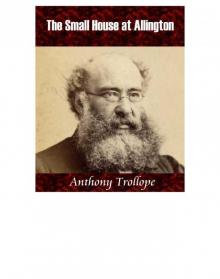 The Small House at Allington cob-5
The Small House at Allington cob-5 The Duke's Children
The Duke's Children Phineas Finn, the Irish Member
Phineas Finn, the Irish Member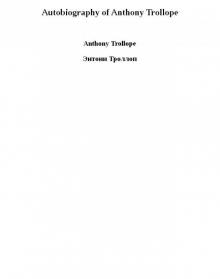 Autobiography of Anthony Trollope
Autobiography of Anthony Trollope